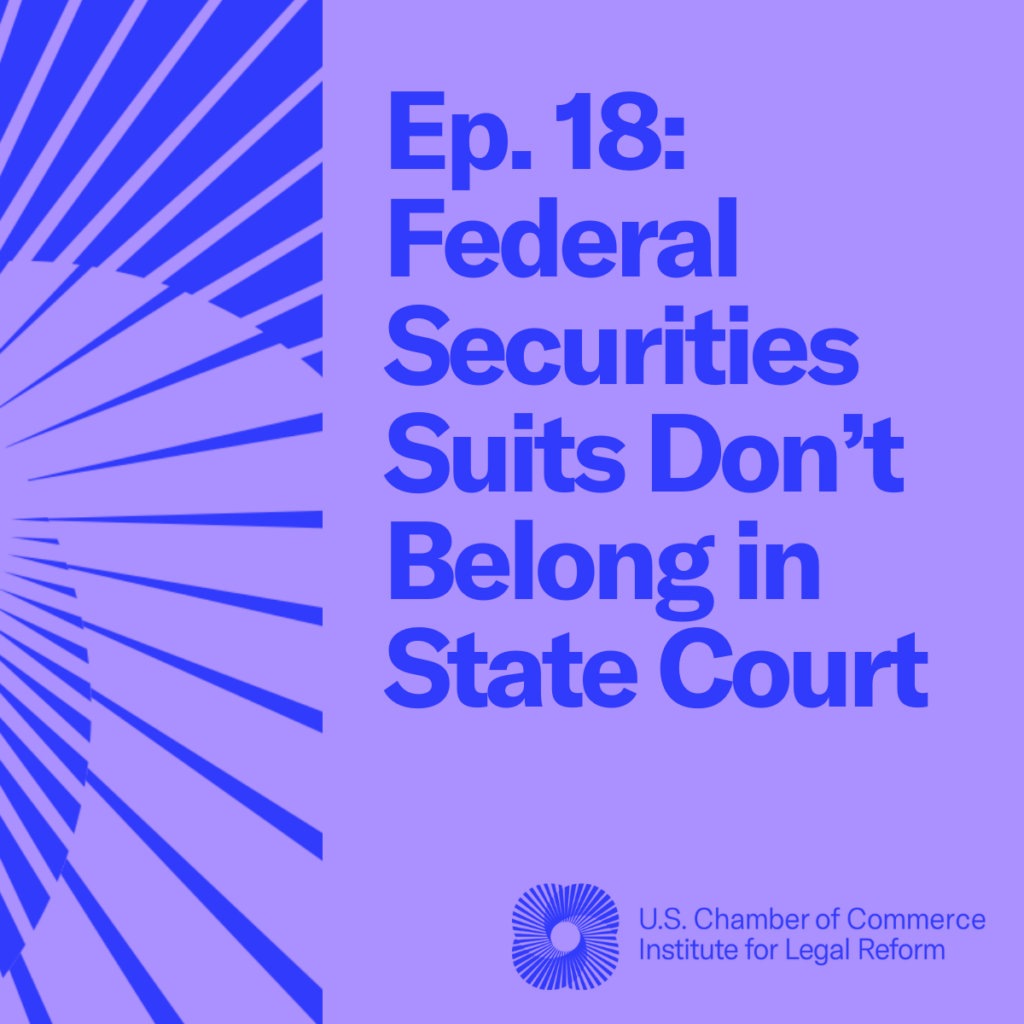During these tough economic times, the roughly 50% of all Americans who have their retirement and other investments tied up in the stock markets have a lot to worry about. Inflation. The mortgage meltdown. Rising fuel costs.
However, obscured by these recent crises is a proven threat that has destroyed billions of dollars of average shareholders’ wealth, year after year. The menace: securities class action lawsuits.
In order to better understand this growing threat, the U.S. Chamber Institute for Legal Reform (ILR) initiated a new, comprehensive analysis of securities litigation in America. The recently issued report, “Securities Class Action Litigation: The Problem, Its Impact, and The Path to Reform,” which builds on the work of previous capital markets commissions and academic research, lays out substantial evidence that securities class action lawsuits are endangering the health of U.S. businesses, the prosperity of American families and the strength of our nation’s global competitiveness.
If that weren’t bad enough, the analysis also reveals that the system is often subject to extortion and abuse – as we’ve seen in the indictments and jailing of some of America’s most prominent securities plaintiffs’ lawyers.
In short: America’s securities class action system is broken, and now is the time for Congress to fix it.
ILR’s report notes that the costs of the system, already in the billions of dollars each year, are rapidly climbing. Representing about one-half of all federal class actions in the U.S., new securities class action filings increased by 58% from 2006 to 2007. And according to a study released this week by Cornerstone Research and Stanford Law’s Securities Class Action Clearinghouse, the first six months of 2008 produced 63 class-action filings against the financial services sector – more than the total number from all of last year.
Securities class actions are growing, not only in number, but in impact. Last year saw the average estimated monetary losses in suits double from the year before. Also, businesses in 2007 saw their market capitalization plummet by a combined $151 billion the day after they were sued – a figure nearly double from 2006.
Settlements are also on the rise. After weighing the costs to the stock price, the impact on company reputation and litigation expenses in defending against a securities class action lawsuit, most businesses decide it’s less costly to settle even the most baseless claim. And plaintiffs’ lawyers know this. In light of the overwhelming pressure on companies to settle, plaintiffs’ lawyers have driven up settlement costs dramatically, generating approximately $51.8 billion in settlements over the past decade.
Led by the multibillion dollar plaintiffs’ lawyer industry, the system exacts enormous costs both to businesses and average shareholders. Between 1995 and 2005, securities class action litigation caused the destruction of nearly $25 billion of shareholder wealth.
So how does a system go from supposedly protecting investor wealth, to destroying it?
For one, settlement payments in securities class action suits are not financed by wrongdoers, but rather by innocent investors. This is because the defendant company, not the individuals guilty of wrongdoing, almost always pays the settlement, defense lawyers’ fees and increases in insurance premiums. Therefore, the current system essentially requires one group of innocent shareholders – those who hold the stock at the time of the judgment or settlement – to pay another group of innocent shareholders – those who are in the litigation class.
In addition, once settlements are negotiated, injured investors usually recover only a tiny fraction of their alleged losses – averaging pennies on the dollar. The rest is siphoned off to pay transaction costs to plaintiffs’ lawyers and other middlemen.
So, as a result of our broken securities class action system, U.S. companies, workers with retirement accounts and small investors are all taking a hit. And so is the competitiveness of the U.S. capital markets.
A number of recent independent reports concluded that securities class action lawsuits hurt the competitiveness of U.S. capital markets. In fact, a 2007 Financial Services Forum study found that nine out of every ten foreign companies it surveyed de-listed from a U.S. exchange in the last four years, in part, because of our litigation environment.
If foreign companies have an impression that the U.S. legal system is hostile, that’s because it is. Foreign issuers have been the targets of enormous settlements: in 2006, 13 foreign issuers settled securities class actions for a total of $2.4 billion, and two of the top ten largest settlements of all time involved foreign issuers.
Unfortunately, those pushing our economy to the edge of the cliff by extorting U.S. companies are some of the most powerful and wealthy plaintiffs’ firms in America.
Using the downfall of securities giant Milberg Weiss LLP as an example, the report indicates that the systemic failures have been exacerbated by trial lawyers who abuse the class action mechanism for profit. Additionally, the integrity of the system has been further undermined by a “pay to play” culture, in which plaintiffs’ law firms ensure their status as lead counsel by contributing to the political campaigns of officials who control the large public pension funds that bring these lawsuits.
The report calls on Congress to investigate the fraud and abuse endemic in the securities plaintiffs’ bar. In addition, it suggests a number of potential legislative changes that, if enacted by Congress, would help to keep our nation on a prosperous and competitive course. Those reforms include:
- Enacting the “Securities Litigation Attorney Accountability and Transparency Act,” (S.3033, H.R. 5463) introduced by Senator John Cornyn (R-TX) and Congressman Jeb Hensarling (R-TX), which, among other things, would cast sunlight onto the relationships between attorneys and plaintiffs, eliminate pay-to-play conflicts and other suspicious connections between attorneys and elected officials, and introduce a competitive bidding process for the selection of lead counsel;
- Ensuring coordination between SEC Fair Funds recovery and private class actions in order to promote efficient compensation and prevent wasteful, duplicative recovery by shareholders;
- Providing defendants equal access to appeal denials of dispositive motions in order to reduce the intense pressure to settle meritless suits following the denial of a motion to dismiss or a motion for summary judgment; and,
- Curbing abuse of civil discovery, the costs of which fall disproportionately on defendant companies and create enormous pressure to settle, by shifting the cost of discovery from defendants to plaintiffs when discovery requests are only loosely related to the claims and defenses being litigated.
Now is the time for Congress to act. The cost of continuing to ignore the growing threat imposed by the securities class action system is simply too much for our economy – and the average investor – to bear.



